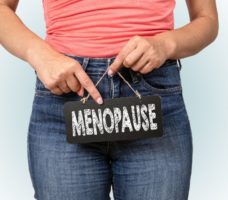Coffee is our go-to drink. We take it first thing in the morning and many times during the day. It increases energy levels. Drinking coffee is also synonymous with having a productive day. Before menopause, I couldn’t survive a day without my cup of black joe. I needed it to get anything meaningful out of my day.
But then Menopause hit, and it came with painful and debilitating hot flashes and night sweats, among other symptoms. I talked with my healthcare provider, who had me cut out some things from my diet to combat the symptoms. I had to cut down on pepper and the glass of wine I took occasionally; they also made me remove coffee from my diet.
At first, I was devastated. Coffee was my go-to drink for productivity and energy, and now I couldn’t take it anymore. How was I supposed to function? So I read extensively and talked with my healthcare provider, and I found certain alternatives to coffee for us menopausal women. These alternatives offer the benefits of coffee but without the side effects.
This article looks at these alternatives and how they work, but first, let’s understand why coffee is not so good for us to start with.
Is Coffee Bad For Menopausal Women?
You probably had a cup of coffee this morning. About 64% of adults in the country drink coffee regularly, consuming more than 146 billion cups per year. 66% of women drink a form of coffee which is higher than the number of men.
But why do we drink coffee so much? Here are some of the reasons I found why women take coffee:
-
Most people who take coffee do so because of its energy boost. The world is busy, and women have to juggle several responsibilities. To keep from breaking down, you might have resulted to taking a cup, or three, of coffee every night.
-
Coffee is also tied to many health benefits, especially brain health. I read a study that showed coffee offers some sort of protection from neurodegenerative diseases and improves retention. Other studies also tie coffee to preventing liver cirrhosis, kidney stones, and some cancers.
-
For certain people, it could be due to habit or a part of their culture. A friend of mine would drink a cup of coffee after dinner. It was part of her nightly routine, and dinner wasn’t complete until she had brewed a pot. I also found that in Italy, drinking espresso after dinner is part of Italian culture.
-
Other people drink coffee because they have slowly become addicted to it. We know this isn’t so positive, but it is the truth. Coffee contains caffeine as the main ingredient. It is psychoactive and can cause an addiction.
-
Some people drink coffee because it tastes good. The first time I had a cup of black coffee, I shuddered. I thought it was the most horrible thing I would ever get to taste. But eventually, I grew to appreciate coffee’s subtle flavors and depth.
-
Physical addiction is not the only reason why people might grow to depend on coffee. It could be psychological too. When you have built essential parts of your routine around coffee drinking, it becomes difficult to separate the coffee from these activities.
With all these reasons, it is not difficult to see why many people are drinking coffee.
But Is Coffee Bad For Menopausal Women?
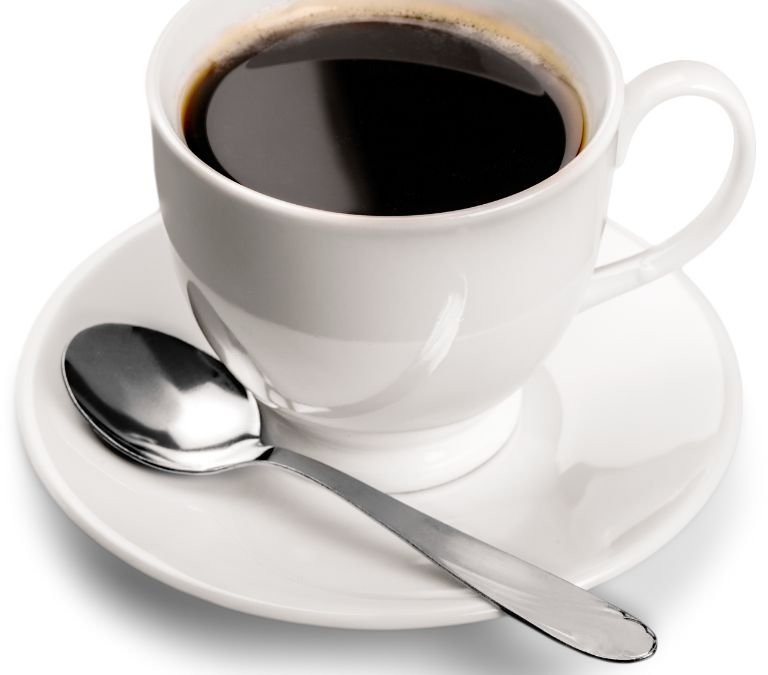
Coffee has disadvantages even for women who are not menopausal. Once I had more than my usual dose because I was working late, and the high amount of caffeine turned me into a nervous and agitated wreck. I could barely hold my pen.
Coffee can also cause digestion issues and headaches, and as much as we like to brag about how good a properly brewed cup of coffee tastes, some people still find it bitter.
But when we become menopausal, we acquire a few more reasons to avoid coffee.
Studies show that caffeine might have a hand in your vasomotor symptoms. Simply put, your coffee could be the reason for your night sweats and hot flashes. So if you have troubling vasomotor symptoms, it might be time to reduce your intake of coffee and any other drink containing caffeine.
But What Do We Do About All The Benefits?
When I discovered that coffee might be the reason for my intense menopausal symptoms, I was reluctant to give it up. Coffee was an important part of my day, and I knew of its benefits. But something had to go, and I knew my menopausal symptoms would not go if I continued taking coffee.
So, I decided to look for alternatives to my daily coffee routine. At first, I started with water, but that didn’t last long. It didn’t do much in replenishing my energy, and it increased my trips to the toilet.
So I delved a bit deeper, and with a little help from my healthcare provider, I found a few alternatives to coffee. These alternatives offer the same benefits as coffee but do not cause or increase the vasomotor symptoms we get from drinking coffee.
Alternative To Coffee For Menopausal Women
I will list some healthy alternatives for coffee that do not cause menopausal symptoms. These alternatives are drinks, too, but unlike coffee, they do not contain caffeine and so will not induce or increase vasomotor symptoms.
-
Chicory Coffee
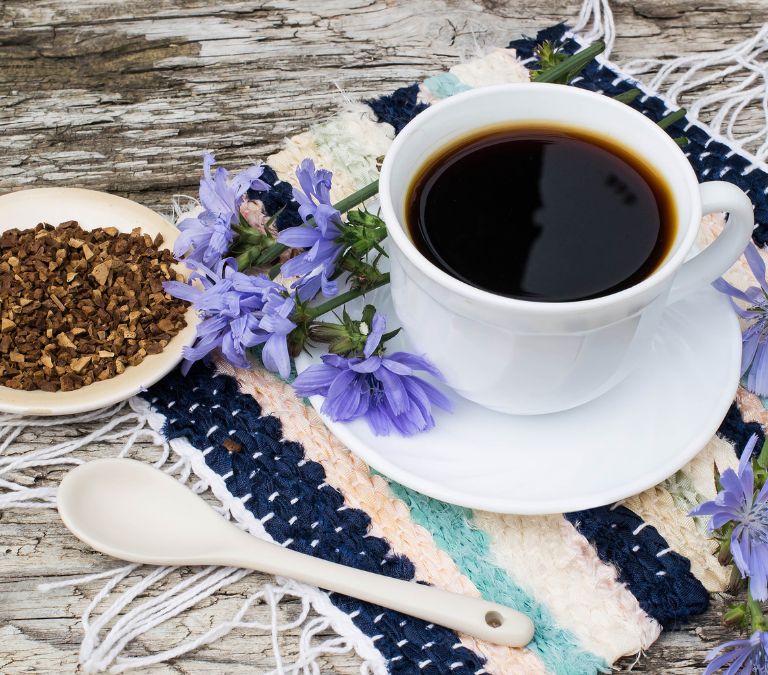
Coffee is made from roasted coffee beans, and chicory coffee is made from roasted chicory coffee. Roasted chicory roots can be brewed the same way you brew coffee and taste the same. And here is the kicker, chicory root has no caffeine.
So, chicory coffee might be a healthy alternative if you like the taste of coffee but can’t deal with the caffeine. And the great thing about chicory coffee is that it has other health benefits.
It is a good source of digestive fiber, inulin. Inulin promotes the growth of good bacteria in the gut, especially bifidobacteria and Lactobacilli. These bacteria aid digestion and helps maintain a healthy gut.
Chicory root is also great for fat digestion because it causes your liver to produce more bile.
You can source chicory root locally, and it is quite easy to prepare. Brew it like your regular coffee and enjoy the taste of coffee without the health implications.
Now keep in mind that chicory coffee is not free of side effects. Some people who take chicory root say it causes digestive symptoms. Inulin can also cause bloating or gas. Also, taking chicory instead of coffee might not eliminate your hot flashes.
-
Golden Milk
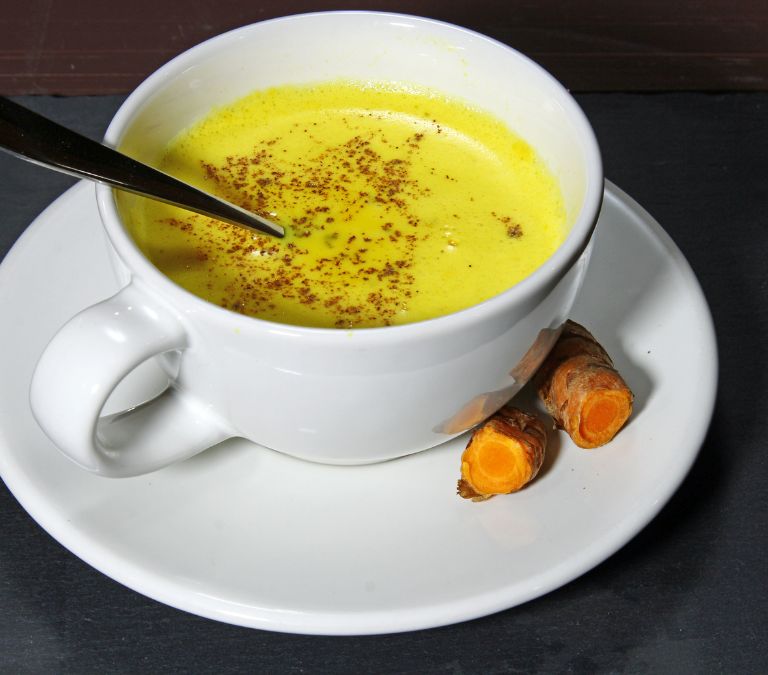
Another good substitute for coffee is golden milk. It is rich and filled with nutritional goodness but does not have a drop of caffeine.
Golden milk is usually made from a combination of the following spices:
-
Ginger
-
Tumeric
-
Cinnamon
-
Black pepper
These spices are combined with milk or its non-diary substitutes to produce a rich drink. It can also contain honey, cardamom, and vanilla. It is golden, which is why it is called golden milk. The turmeric in it also has anti-inflammatory properties. This is because it contains Curcumin.
Black pepper and fat also increase the absorption of curcumin, which is why you are advised to make the drink with whole milk. However, fat is not good for menopausal women, so talk with your healthcare provider to see what form of milk or milk substitute you should use.
Oh! And one last thing you should know about golden milk is that it is easy to make. You can make it in your kitchen in five minutes. Five minutes and you can enjoy all the nutritional goodness of golden milk.
-
Lemon Water
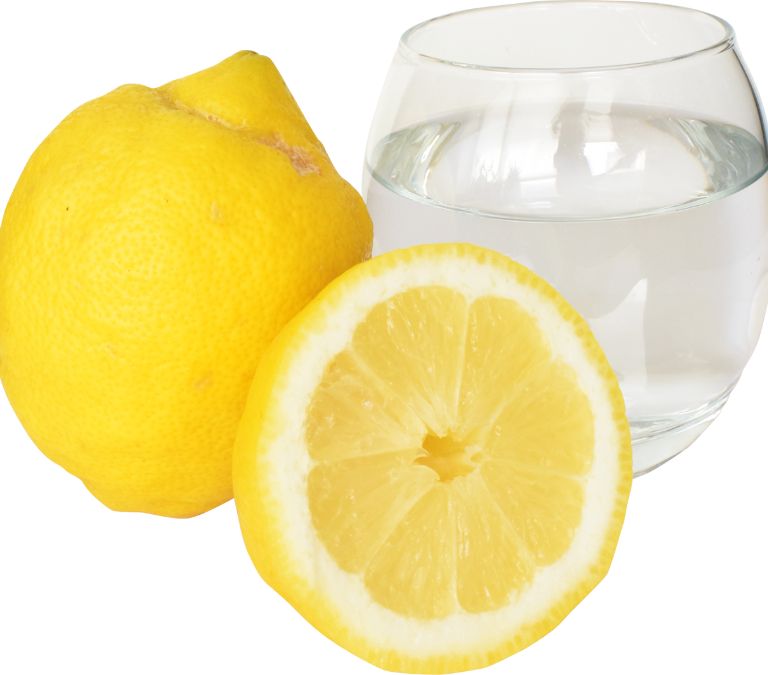
Your morning drink doesn’t have to contain complicated ingredients. If you do not have the time or don’t want to bother with difficult brewing and stirring, you might prefer a cup of lemon water. It is simple to make and extremely refreshing to drink.
Lemon water does not contain caffeine and has no calories. Because it does not contain caffeine, it won’t contribute to your hot flashes or any other vasomotor symptoms. Also, because it does not contain calories, it will not cause an increase in weight. You might have heard that an increased body mass might increase your chances of getting vasomotor symptoms during menopause.
It is also a great source of vitamin C. Vitamin C is an antioxidant that plays an important role in protecting your immune system and skin. Vitamin C is needed to create collagen, which helps maintain the structure of the skin and skeletal system.
Collagen is also great for menopausal women. During menopause, we notice changes to our skin. They start to sag, and they become dry and dull. Collagen helps retain the vitality of our skin by keeping them hydrated. It also helps eliminate wrinkles. So a glass of lemon water will not only not cause hot flashes but might also help combat other menopausal symptoms.
Lemon water is also very easy to make. Just add juice from a lemon to cold water for a glass. Adding other fruits and herbs can also improve the taste and increase the nutrient. However, be careful not to add anything that might increase your symptoms.
-
Apple Cider Vinegar
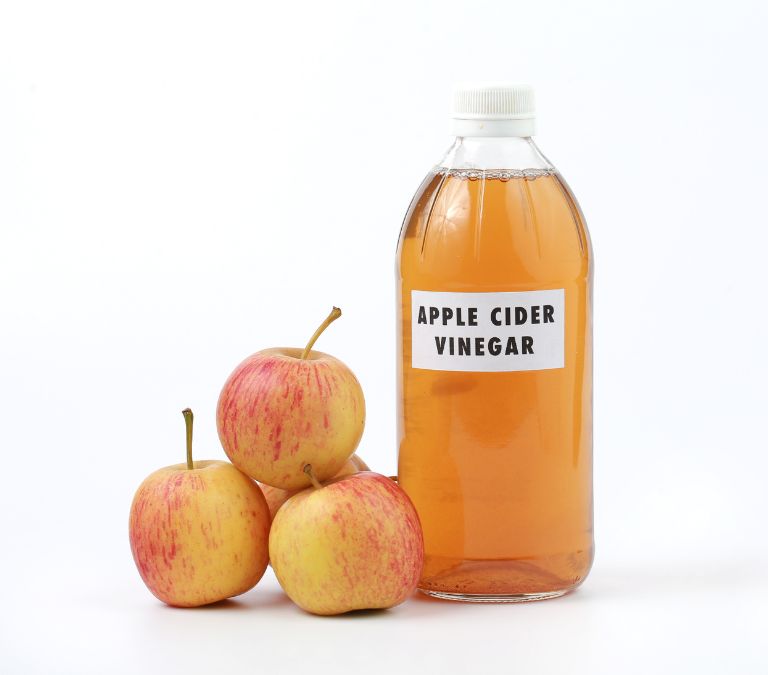
Apple cider vinegar is one of my favorite healthy alternatives to coffee. Like all the drinks in this article, it does not contain caffeine and has many other health benefits.
Apple cider vinegar is a bit more complicated than the other drinks we have mentioned. It is made when you use yeast and vinegar to ferment crushed apples.
This might sound like a lot of work. Fortunately, you can get apple cider vinegar commercially.
Let’s look at some of the benefits of this drink. It does not contain caffeine, so it will not induce or increase menopausal symptoms like the other drinks in this article.
Apple cider vinegar contains acetic acid, which is great for insulin sensitivity and reducing blood sugar levels.
A study where people with insulin resistance took 0.5 tablespoons of apple cider vinegar showed that it could reduce their blood sugar levels by as much as 64%.
Anecdotal evidence shows that apple cider vinegar might also cause a feeling of fullness and is great for people seeking to lose weight. As menopausal women, we all seek to lose as much weight as possible.
Apple cider vinegar also has benefits specific to people like us. Its alkalizing properties might help combat hot flashes and night sweats. It contains magnesium which will help promote bone health and reduce mood swings and psychological symptoms.
Apple cider sugar contains many helpful bacteria and enzymes that play anti-oxidative functions. It helps flush out toxins, so you don’t feel as bloated.
You make your apple cider vinegar drink by combining raw apple cider vinegar with a cup of cold water and adding a sweetener.
Taking apple cider vinegar comes with side effects, though. It contains acetic acid, which might burn the throat, so ensure you dilute it before drinking. It could also wear out the enamel on your teeth. Remember to rinse after taking it.
Teas
Tea and coffee have always had a sort of rivalry. People who take one often look at people who take the other with disappointment. However, for menopausal women, we might not have any other option but to switch to teas.
Teas are made by brewing leaves, roots, seeds, or flowers in hot water. They often come with health benefits, and most of them do not have caffeine. I did a little research and discovered different teas that might help women with menopause while serving as an alternative to coffee.
Licorice Tea
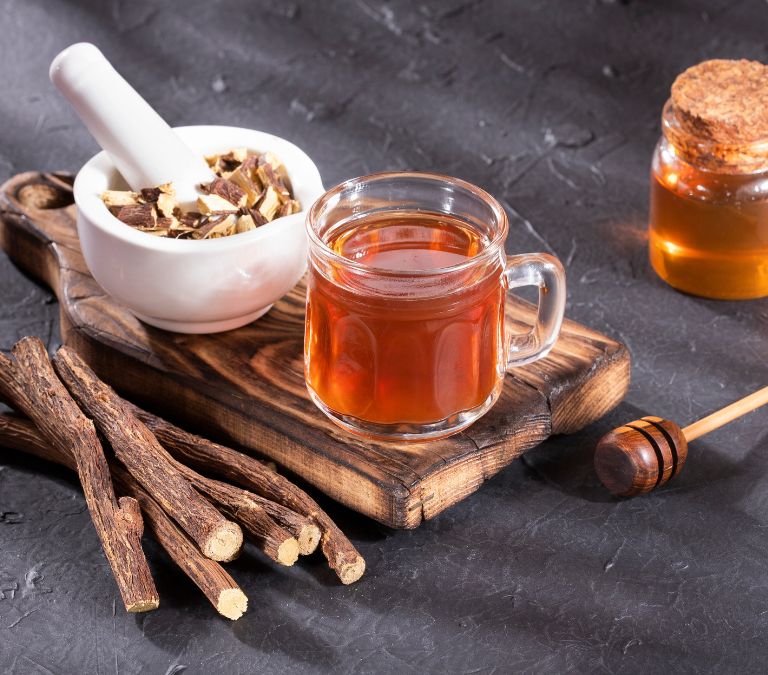
If you were to carry out a survey, I am sure you would find that the number of people who love this tea is close to the number of people who loathe it. However, there is no denying that it is great for menopausal women.
A good thing about licorice tea is that it is sweet. It is great for people who also want to avoid how bitter coffee can get.
Let’s talk about the benefits. Licorice tea can help reduce the severity and duration of hot flashes in women with menopause. It is also high in phytoestrogen, otherwise called plant estrogen. It helps balance the low level of estrogen we face during menopause. Because it is rich in phytoestrogen, this tea might produce similar effects in women, relieving the symptoms caused by low estrogen levels during menopause.
There are various pieces of anecdotal evidence of people using licorice tea to combat menopausal symptoms, especially in the field of alternative medicine.
Licorice tea is great for reducing stress and helps promote respiratory health. It helps to keep cortisol and balancing hormone levels normal. Licorice tea is very relaxing and helps support the nervous system. Menopause is stressful, especially for people with intense symptoms, so finding ways to relax is necessary. With licorice tea, you can increase your chances of having a relaxing night. Licorice tea is a great alternative for those who feel the need to take a cup of coffee before they go to bed.
You can add some honey and fennel seeds for taste and added benefits. You can also mix it with other teas. However, be careful when you are taking licorice tea. It is not great for people with high blood pressure. It also reacts with certain medications, so ensure your healthcare provider gives you the go-ahead before you try it.
Green Tea
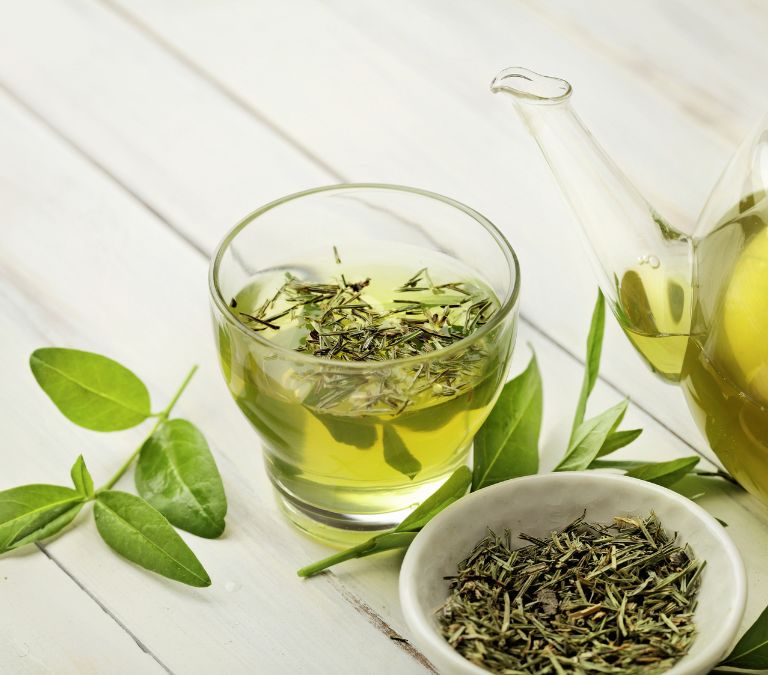
I know how hard it can be not to get your daily dose of caffeine because you can no longer take coffee. Green tea might be a great and healthy alternative to get your caffeine hit if you find it hard to give up on caffeine.
I came across a study that showed how effective green tea could be in warding off menopausal symptoms. This study showed that drinking green tea regularly can increase bone metabolism and protect against bone fractures. You might already know this, but as we enter into menopause, the risk of getting osteoporosis increases. The risk is even higher if you have a family history of the condition. We need all the support our bones can get.
Green tea is also one of the richest sources of antioxidants. It also contains epigallocatechin (EGCC). EGCC is a form of catechin, a potent antioxidant. It helps prevent aging, weight gain, and inflammation and decreases the risk of brain and heart conditions.
It boosts metabolism, making it easier to combat that weight gain we have to deal with as we enter menopause.
Of course, green tea contains caffeine, so you might think it will increase hot flashes, but this isn’t the case. Because it is full of antioxidants, it reduces inflammation and fights stress. These two are the greatest inducers of hot flashes and night sweats. Green tea also aids in weight loss, and you might know that weight gain triggers hot flashes.
Overall, drinking green tea comes with a few risks, and you can make it in different flavors. It will make a great replacement for your nightly cup of joe.
Ginger Tea
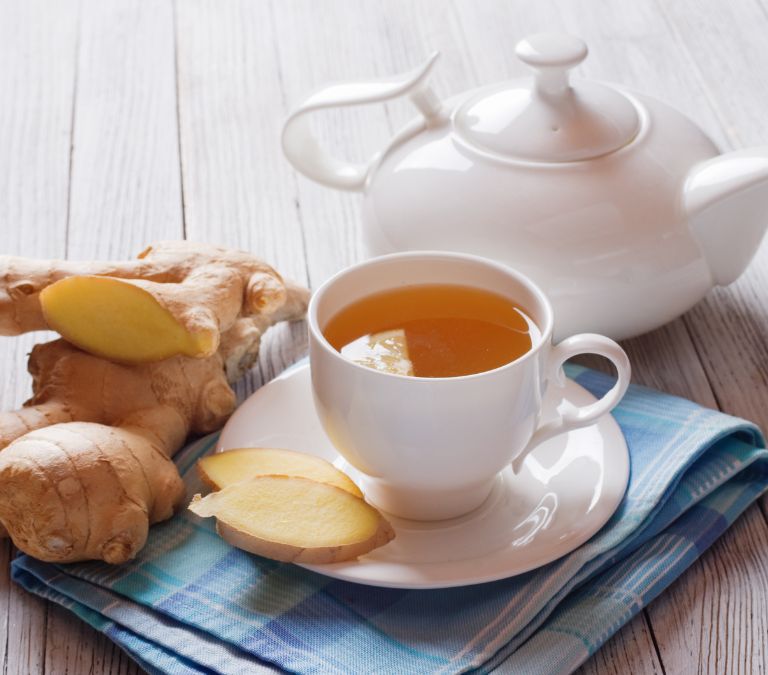
Ginger tea is another healthy alternative to coffee. Originally ginger tea served as a great digestive aid. But it can also be used to fight some menopausal symptoms.
We all know of the common menopausal symptoms like hot flashes and night sweats, but other symptoms are not as common but can be equally stressful. I am talking about the wave of nausea and vomiting we feel from time to time or the upset stomach.
Fortunately, ginger tea can offer a level of relief from these symptoms. If you are showing menopausal symptoms related to digestive issues, then ginger tea might be a great way to go.
Ginger tea could also help with the pain and aches you feel in the morning when you wake up.
I also came across several studies that claimed ginger could help with the more common menopausal symptoms like hot flashes and night sweats. It also helped increase estrogen levels while reducing body weight. There is still a need for more research before we can say that ginger helps with these symptoms. But most research has had positive outcomes.
Most healthcare professionals will recommend these drinks as a substitute for coffee and caffeinated drinks. You can make your own ginger tea at home (the process is quite simple), or you can buy it from your local store. Ginger is also great for when you have a gold or during winter. Don’t forget to add a dash of honey or lemon juice for more flavor.
Rooibos Tea
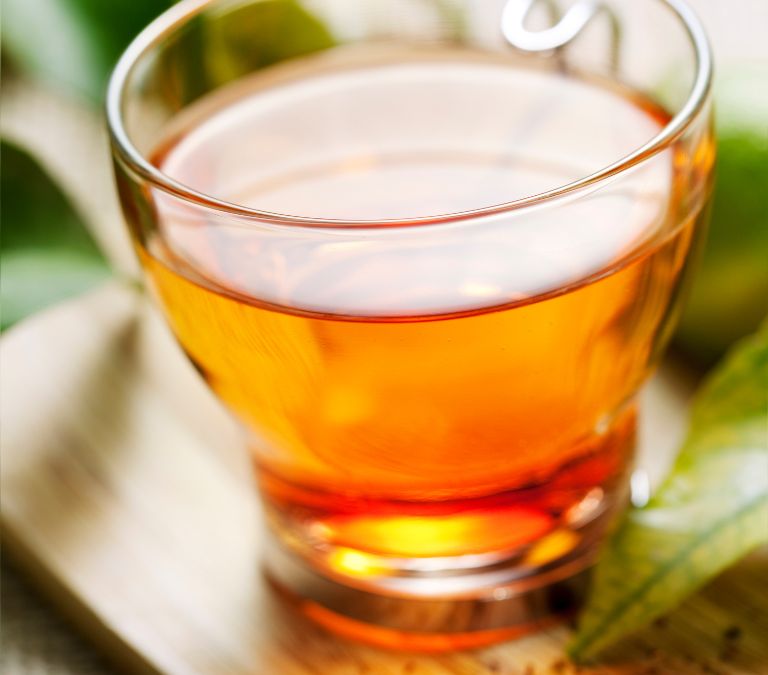
Rooibos, or red tea, is a popular drink with roots in South Africa. It does not contain caffeine and is filled with many nutrients, making it one of my favorite drinks for combating menopause.
Rooibos is low in tannin antioxidants. Tannin has its benefits but interferes with iron absorption in the body. Iron is an important nutrient during menopause, so the fact that rooibos is low in tannin is not bad news at all.
Rooibos is great for preventing diseases and warding off signs of aging. It is rich in aspalathin and other antioxidants. Aspalathin impairs stress hormone secretion, preventing fat storage, hunger, and metabolic disorders.
Rooibos also contains quercetin, an antioxidant that benefits the heart and reduces the risk of some cancers. Rooibos tea is also great for maintaining normal blood sugar levels, especially for people with type 2 diabetes.
A daily dose of rooibos tea means a healthier heart because studies have shown that the tea can reduce low-density lipoprotein and increase high-density lipoprotein.
Getting your perfect brew of rooibos tea takes just a few minutes daily. You can add to the flavor using lemon, mint leaves, and sugar. Unlike most teas, rooibos tea does not become bitter if you over steep it and instead gives off a sweet, fruity flavor.
Ginseng Tea
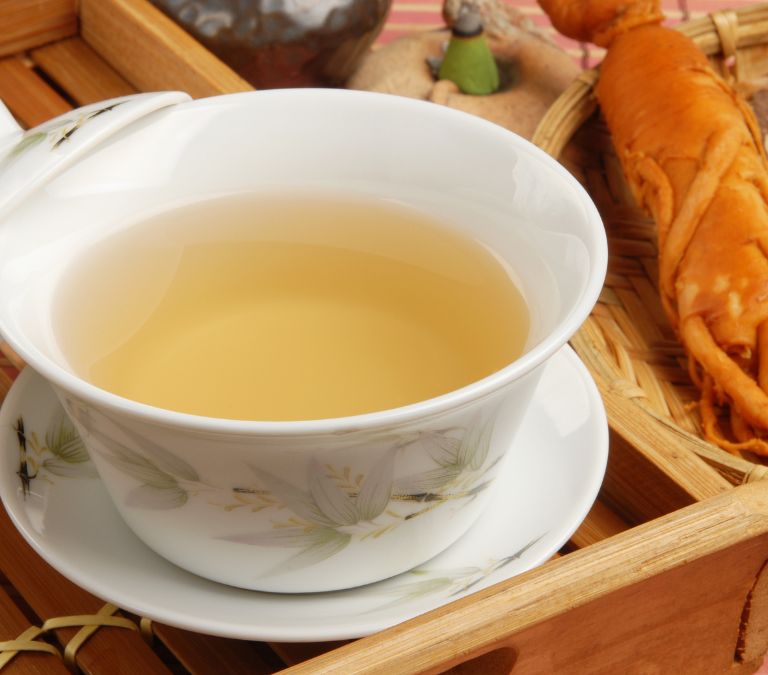
Ginseng is an ingredient used for the management and prevention of several conditions. Red ginseng is considered one of the best gifts in Asia and has been revered for many years in Korea, China, Japan, and America. You could pick up literature written more than 10 centuries ago and find glowing reports on the benefits of ginseng.
So it isn’t surprising that ginseng is beneficial for menopausal women. When brewed into tea, Ginseng has to revive properties that could reduce the intensity and frequency of hot flashes and night sweats. Ginseng is also great for the heart. It reduces the chances of cardiovascular disorders during menopause.
Ginseng tea might also help women who have lost their libido due to menopausal complications. Ginseng has been used to increase libido even before people knew what the word was. Taking this tea might increase your sexual arousal and improve your sex life.
However, there are drawbacks. Because of how popular the product is, ginseng and ginseng products are on the expensive side. Ginseng is also not great for people taking medication for certain conditions. If you are actively treating diabetes and blood pressure or taking any form of blood thinners, contact your healthcare provider before consuming any ginseng product.
Sage Tea
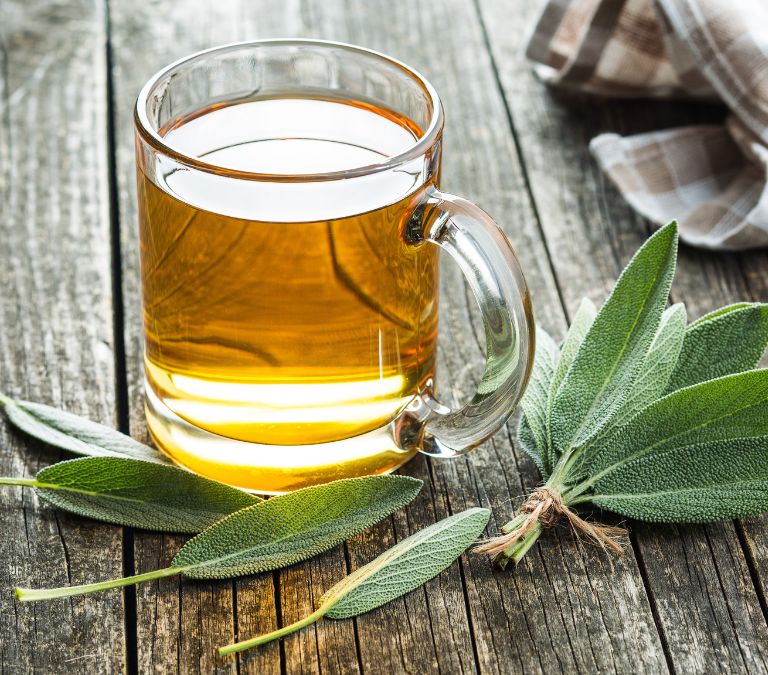
I always thought sage was only good for dispelling bad spirits in the home. I was shocked that the sage plant is packed with health benefits for everyone, especially menopausal women.
It is full of antioxidants and has many benefits, from helping lose weight to ensuring we have supple and full hair. Now there isn’t much research to show the health benefits of sage leaves, but the few that have been carried out and all the anecdotal evidence point to one thing; sage is great for us.
It has shown promise in reducing hot flashes and night sweats by mimicking the effects of estrogen. However, not everyone gets the same effect, so if you start and it works for you, then, by all means, continue. If it doesn’t, you can continue taking sage tea for the other health benefits and as a healthy replacement for caffeine.
A cup of sage tea a day might also increase your overall health by ensuring you are properly hydrated. The antioxidants also go a long way in maintaining health.
However, be careful when taking sage tea. It contains camphor and thujone; both can be poisonous when taken in high concentrations. However, you should be fine unless you drink an average of 4 cups per day.
Sage tea is easy to make, and you can find tea bags online or at your local stores. You can also get the nutrients of sage leaves from different tea blends.
Nettle Tea
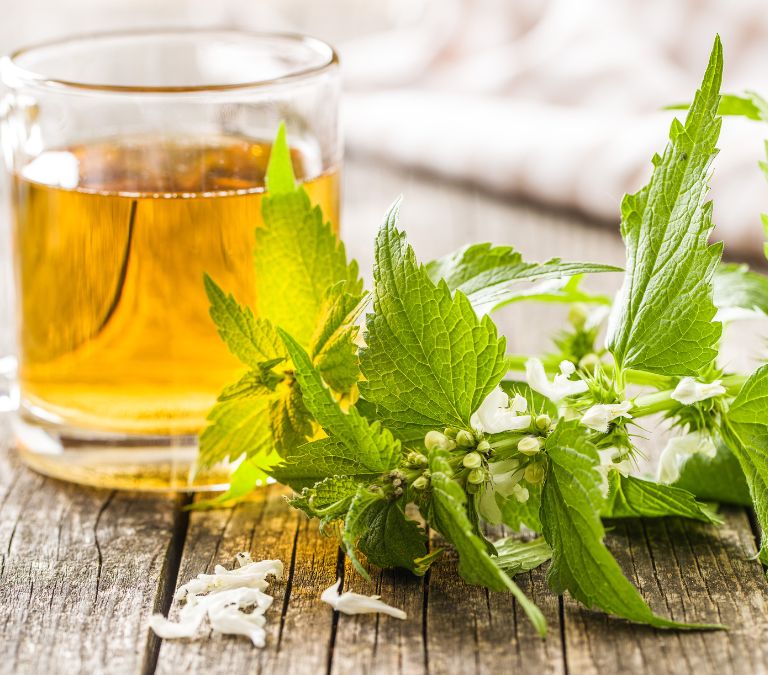
This list won’t be complete if we do not include nettle. Nettle is a herbal powerhouse and is very popular because it serves as a natural antihistamine. Antihistamines are used for treating irritable skin, inflammation, and aches in the joints. Do these conditions sound familiar? They are all things we have to deal with because of menopause.
Historically, nettle was used to treat sore and aching muscles. It was the common treatment for people who complained of arthritic pain.
Nettle is also great for cleaning blood. So if you took too many glasses, you could take a cup of nettle tea to help eliminate the effects. Nettle tea is an alkalizing tea that can be taken daily. It is great for those tender or hard breasts we get at some point in the month.
I also came across a study claiming nettle could be used to successfully manage blood sugar levels as it could induce more pancreatic insulin production.
Nettle contains polyphenols, plant chemicals that play a major role in managing chronic inflammation-related chronic conditions. It is also rich in antioxidants and has anti-aging properties.
If you have seasonal allergies (hay fever is quite common), tea brewed from the common nettle might help prevent this. To treat your allergies with this tea, take a cup of nettle tea every day until the allergy season is over.
No matter how you look at it, nettle tea is a great replacement for coffee. And it is very easy to make. All you need to do is steep in hot water for 10 minutes.
Chamomile Tea
This list won’t be complete if we do not include one of the most popular teas of all time; chamomile tea.
Chamomile tea is popular because it exerts a calming effect. If you are plagued with night sweats or insomnia, then a cup of chamomile tea at night is the way to go.
Chamomile is also great for maintaining blood sugar at healthy levels. Several studies have also found that chamomile is good for managing diabetes in combination with other diabetic medications.
As we enter menopause, we are prone to osteoporosis. There is research that shows the possibility that chamomile tea might be great for maintaining bone density, but we can’t say for sure until further research is carried out.
Chamomile is also great for managing inflammation and might even help prevent cancer.
To enjoy these benefits, steep chamomile tea and take a cup anytime you feel like taking a cup of coffee, and you will be reaping the health benefits in no time.
Peppermint Tea
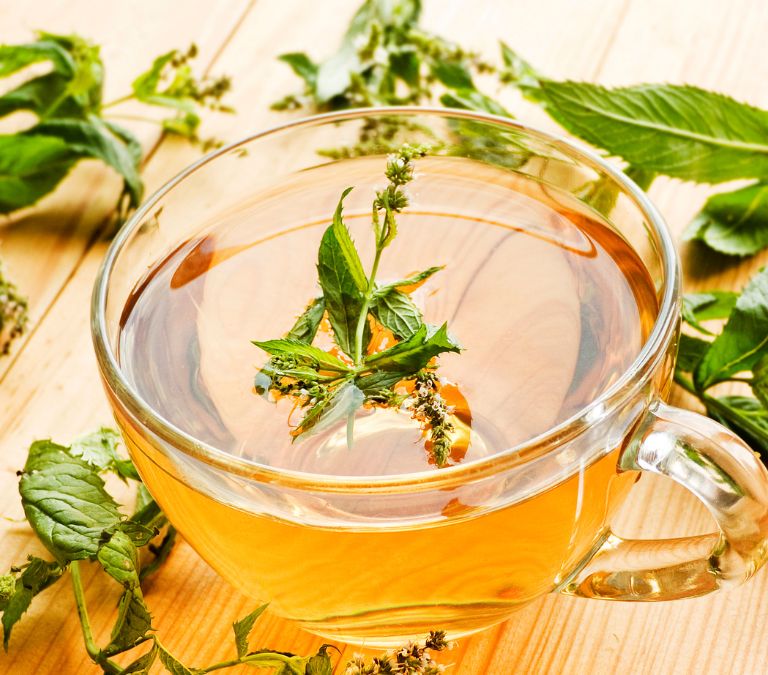
Some women struggle with many stomach issues as they enter menopause. If this is you, peppermint is the perfect tea for you. It is great for managing abdominal gas and is great for muscle spasms.
If you are experiencing hot flashes and night sweats, a cool cup of peppermint tea is all you need to get relief.
I especially like peppermint because it is easy to grow, so you can make a fresh cup with fresh herbs from your garden.
Black Cohosh Root
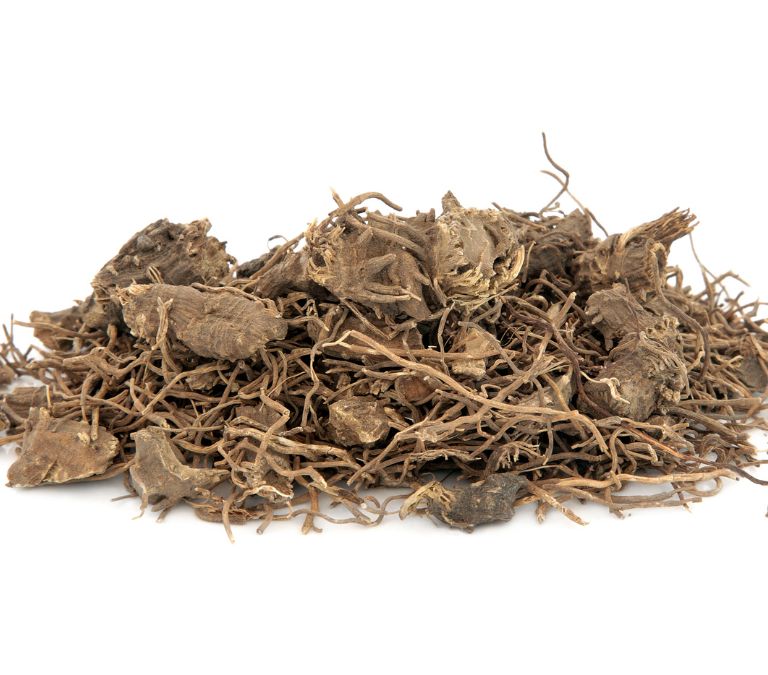
In alternative medicine, black cohosh is used as a replacement for hormone replacement therapy. If you understand the impact hormonal changes have on us as we go through menopause, then you will understand why this tea is on the list.
Black cohosh root is great for treating vaginal dryness. It has also shown promise in reducing how intense our hot flashes are. According to research, women with early-onset menopause stand to gain the most from this supplement.
Black cohosh is also great for insomnia, irritability, tinnitus, and heart palpitations. These are all common menopausal symptoms.
On the flip side, black cohosh isn’t great for anyone getting treatment for liver issues or high blood pressure. Because of how powerful cohosh is and the possibility of interacting with other drugs, I do not advise anyone to take black cohosh root tea without proper clearance from a medical doctor.
Black cohosh might also lead to certain side effects. People have complained of nausea, stomach upset, infection, rashes, breast tenderness, and pain. Regardless, this drink is still a good option if you are looking for an alternative to coffee.
Chasteberry Tree Tea
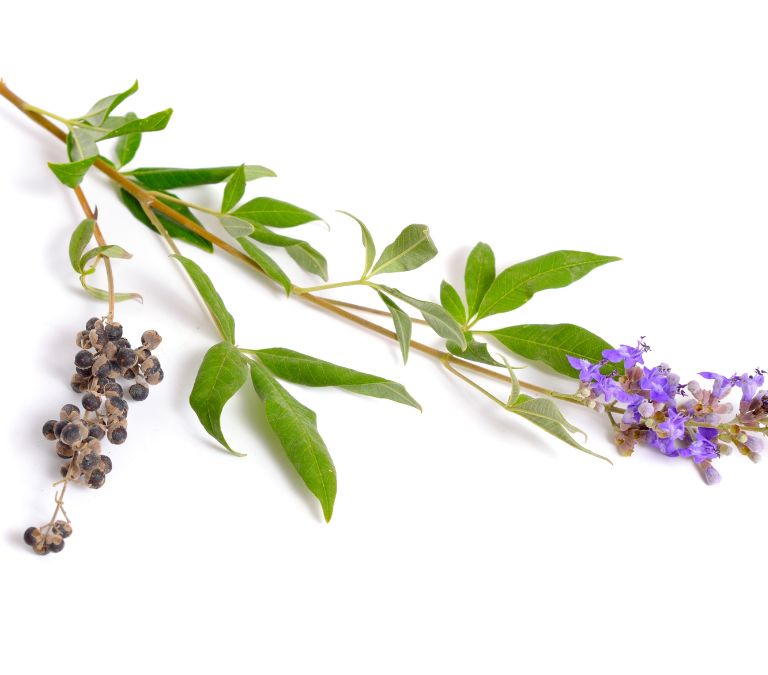
This tea is low on the least becuase it is more commonly used for treating premenopausal symptoms. Chasteberry tree increases progesterone levels and helps maintain the balance between progesterone and estrogen as you transition into menopause.
Chasteberry tree helps improve menopausal symptoms because it functions as a dopamine agonist and reduces prolactin secretion. It also helps maintain the balance between FSH and LH, two hormones that suffer imbalance during menopause.
You can also drink chasteberry tree tea to reduce hot flashes and breast pain.
I do not recommend this tea for anyone on hormone replacement therapy or if you have been treated for any hormone-sensitive condition in the past. It is also not a great choice if you are taking antipsychotics or medication for Parkinson’s disease.
If you do not have any issues with some of the restrictions I have mentioned above, then chasteberry tree tea is a great replacement for coffee.
Red Raspberry Leaf Tea
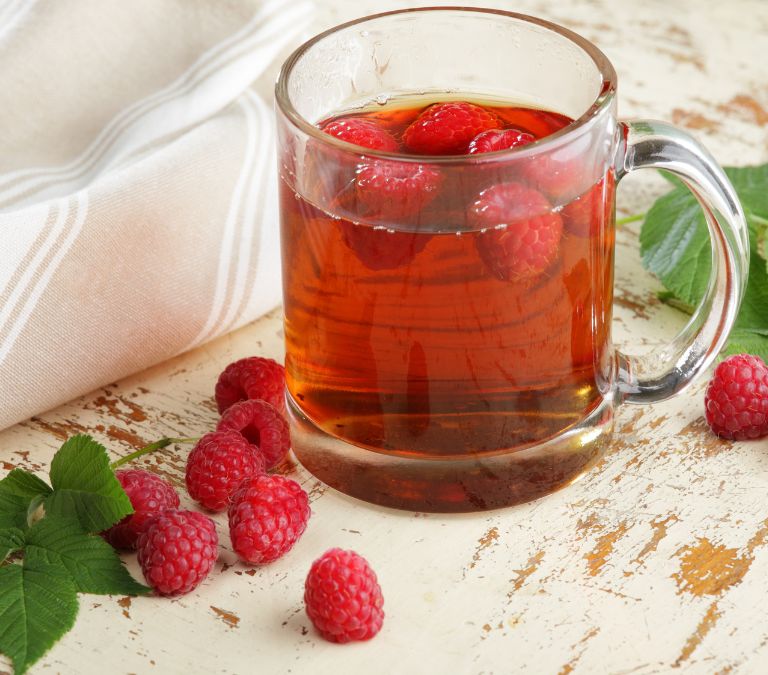
While this tea might not directly link to menopause, it is packed with nutrition and is great for easing the transition into menopause.
I included this tea because it is filled with nutrients that will help make menopause easier for us. But primarily, a red raspberry leaf tea is great for people who see heavy menstrual flows during their transition to menopause.
However, even after a successful transition into menopause, you can continue drinking this tea as an alternative to coffee. It is packed with nutrients and is a rich source of Vitamin C, B vitamins, potassium, magnesium, phosphorus, zinc, and iron. These are all great nutrients for women going through menopause.
However, red raspberry leaf tea might have a slight diuretic effect causing an increase in urination, and might even have laxative effects on some people.
Red Clover

Red clover tea is another great alternative to coffee for menopausal women. It is used to treat hot flashes and night sweats, but it is also great for other reasons.
During menopause, the chances of cardiovascular conditions increase. Red clover is great for heart health and helps maintain normal blood pressure. This tea is also great for combating the risk of osteoporosis in menopausal women because it improves bone strength. Red clover tea is also a great way to boost immunity.
Red clover is a good source of phytoestrogens and can help balance the hormonal imbalance we face during menopause. It can also cause a slight improvement in other menopausal symptoms, such as vaginal dryness, mood swings, anxiety, and depression.
With all these advantages, it would be silly not to include a cup of this tea in your daily routine. It is definitely one of the best alternatives to coffee.
There is a downside, though. Red clover can lead to side effects like nausea, headache, skin irritation, and spotting. However, the chances of these occurring are very slim.
Dong Quai
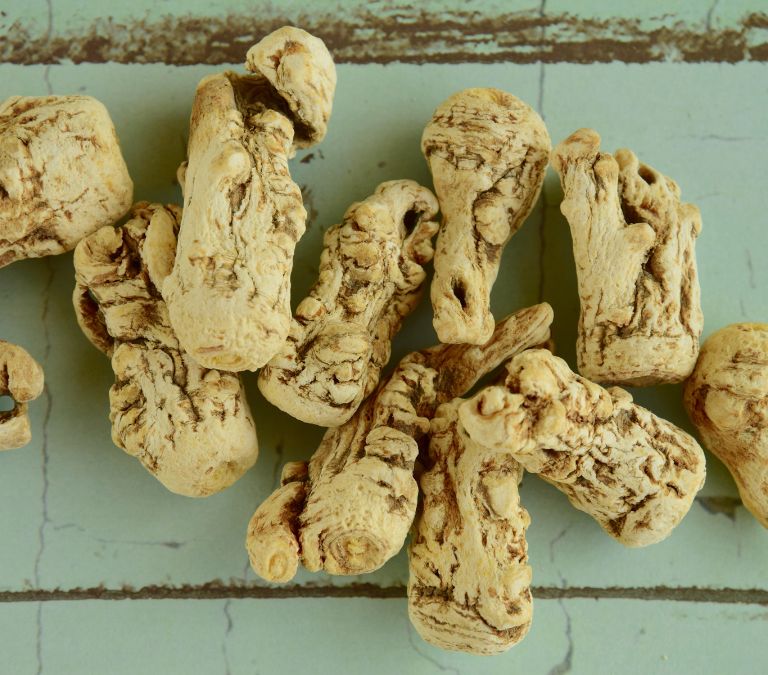
Dong quai tea is special and a great drink for people just entering menopause. It can balance estrogen levels. So if your estrogen levels are low, dong quai can cause an increase, and if they are high, dong quai will cause a decrease in estrogen levels. Considering that most of our menopausal symptoms are due to hormonal imbalance, dong quai is a great option for a coffee replacement.
Dong quai is also great for menopausal pelvic pain. I came across a study where chamomile and dong quai was used to reduce the intensity of hot flashes by 96%.
However, there are a few downsides to drinking this tea. It should not be taken by people who have allergies to carrots and other plants in the carrot family. It is also not a good option for someone expecting surgery, as dong quai can interfere with the clotting profile. People with fair skin have also complained about increased sensitivity to sunlight after drinking dong quai.
However, if you do not fall into these categories, consider replacing your cup of black joe with a cup of dong quai tea.
Valerian Root
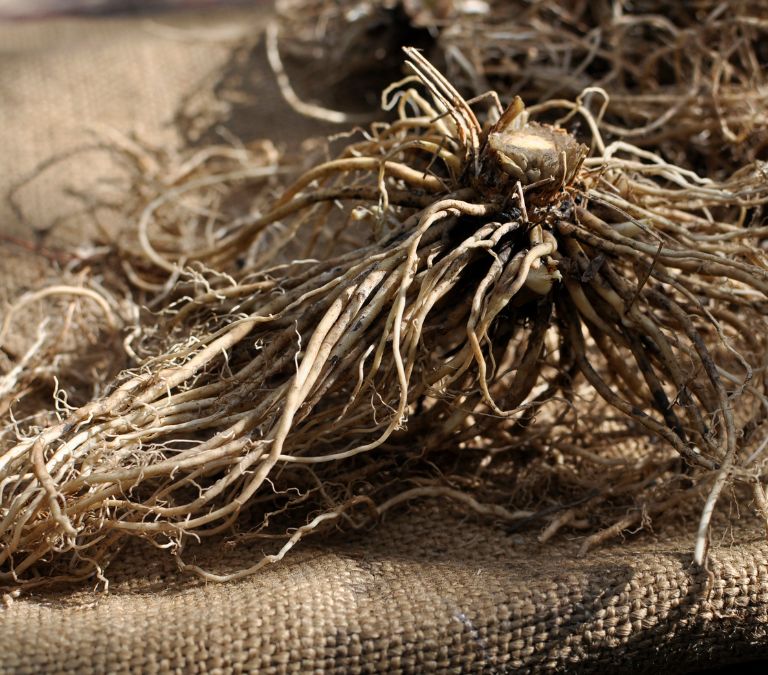
Valerian root combats hot flashes. It also helps with other menopausal symptoms. It’s great for insomnia, stress, and anxiety. It is also used to treat joint pain.
Valerian root has shown promise as a treatment option for osteoporosis because it increases bone strength.
Valerian root improves the emotional and behavioral symptoms we show during menopause.
We know that you are guaranteed a good night’s sleep if you drink this tea before you sleep. This drink comes with minimal risk, and you can take it without harming your health. However, you should not combine this drink with alcohol. You should not combine valerian root tea with any supplement without clearance from your doctor. The interaction between the substances could lead to liver injury.
Ginkgo Biloba
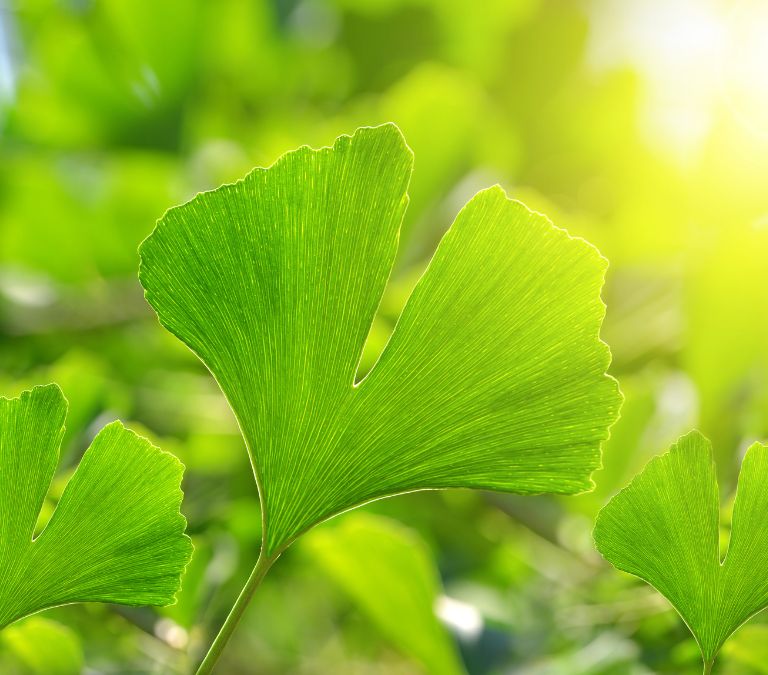
Last on our list of teas is Ginkgo biloba. It is similar to red clover because it contains phytoestrogens that help normalize hormone levels. It is also said that this tea can improve our moods during menopause. It is great for cognitive function because it helps the neurotransmitters in your brain to function properly.
However, this tea is rare, so drinking it instead of coffee might not be challenging. But you can find Ginkgo Biloba in several tea blends.
Some people might be allergic to Ginkgo Biloba. If you are allergic to urushiol and mango rind, you might react to Ginkgo Biloba. Ginkgo Biloba can interfere with platelet function and clotting, but this should not be a problem if you only take it as tea.
Long-Term Consumption Of These Drinks; Any Risks?
I have listed so many drinks that you can take instead of coffee. The question now is, are you taking any risks by taking these drinks regularly?
I will be the first to deny that some of these drinks have potential side effects. I have gone out of my way to list these side effects where necessary.
I want you to know that these drinks are substances that can induce changes in your body due to their components. One of the drinks here might work great for your neighbor but won’t work so well for you. Try and carry out your research to find your perfect fit.
Before taking any of the drinks in this article, tea or not, consult your doctor. If you are taking any prescription medicine, do not take the drinks listed here unless you get approval from your doctor.
Some of the teas on this list can interfere with clotting, and some are blood thinners. Ensure you speak with your doctor about the drink you are taking before you undergo a procedure that might cause you to bleed.
All the drinks on this list do not have caffeine, making them great substitutes for coffee during menopause.
Suppose you are taking these drinks because you are trying to reduce hot flashes, then avid hot drinks, especially if you take them before you sleep. Hot drinks increase your chances of getting hot flashes and night sweats.
Do These Drinks Cure Menopause?
I am sorry to disappoint you; this article is not about menopausal cures. You can’t cure menopause because it is not a pathologic condition. It is a normal phase that we have to go through.
You can only attempt to treat the symptoms or reduce their severity, which is what these drinks do. If you are looking for more traditional ways of combating these symptoms, talk to your doctor, and they will tell you about your options.
Frequently Asked Questions
Should I Stop Taking Coffee Because I Am Menopausal?
I will be the last person to tell you to stop drinking coffee because you are menopausal. However, coffee might be exacerbating your vasomotor symptoms. If this is the case, it might be a great idea to stop drinking coffee and anything with caffeine.
Can These Drinks Cure Menopause?
No, these drinks can’t cure menopause. Some of them don’t even help with menopausal symptoms, but they do not contain caffeine, so they cannot cause any menopausal symptoms.
However, some of the drinks I have listed, especially the teas, have ingredients that can help reduce the severity of menopausal symptoms.
How Common Are Menopausal Symptoms?
Some people might not have menopausal symptoms. You might be reading this article and have not experienced any menopausal symptoms. However, most women will suffer from at least one menopausal symptom. Your symptoms might be mild or severe. However, it is extremely rare for someone to experience all the menopausal symptoms.
Are There Other Treatment Options For Menopausal Symptoms?
There are other ways to treat your menopausal symptoms. A healthcare provider will tell you your options. For milder symptoms, they might recommend lifestyle modifications to help you cope. However, if your symptoms are severe, they might prescribe medications and treatment for you.
You can also try alternative medicine if that works for you. Do not do this without proper clearance from your doctor.
Conclusion
Coffee is great. It has helped many of us through hard and stressful days. However, a time may come when coffee might need to go because they are increasing the intensity of your vasomotor menopausal symptoms.
If this ever happens, do not fret. The drinks on this list are perfect alternatives for coffee. They provide the same benefits and even more but do not cause menopausal symptoms.
Instead of looking for medications to control your menopausal symptoms, try these drinks and see how your life improves. Do not take these drinks without telling your doctor first. Let them help you find the perfect replacement for your cup of black joe.





